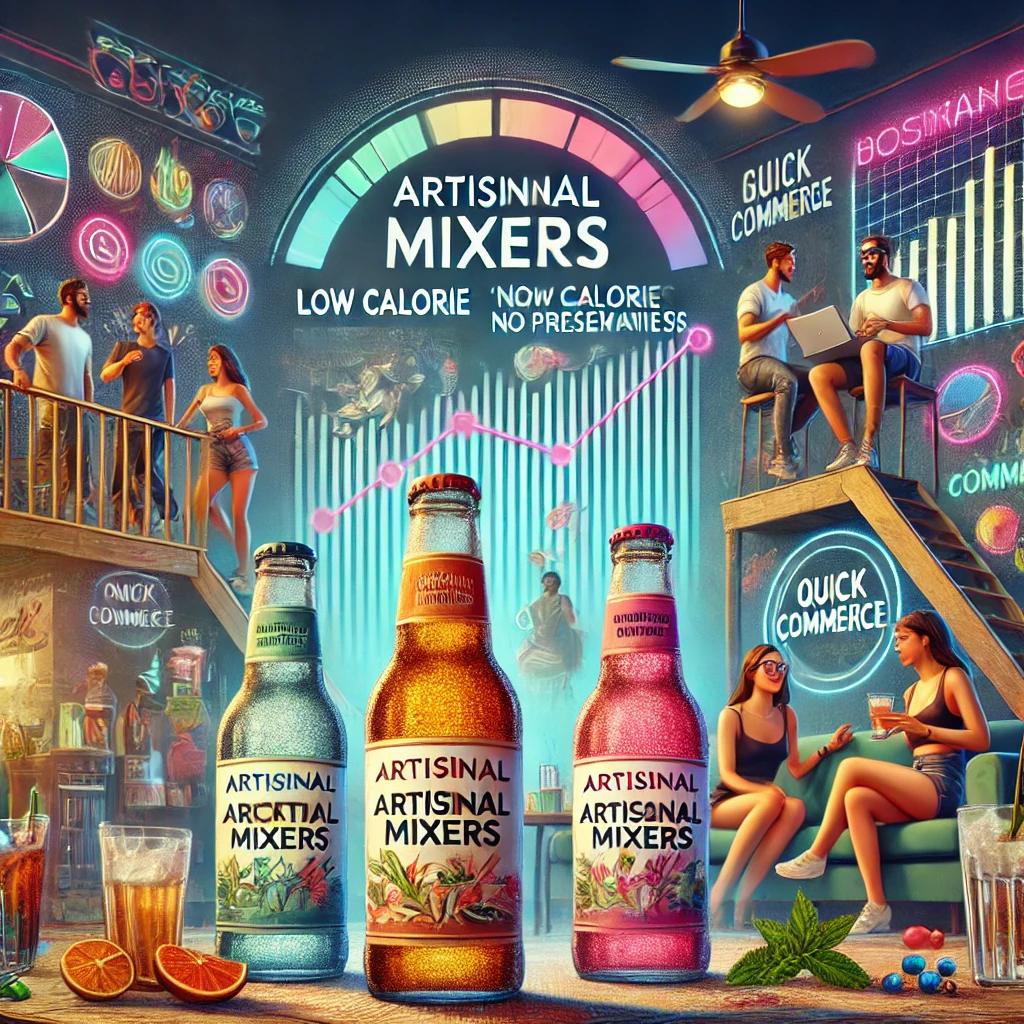Cheers to health! Non-alcoholic mixers created by small producers are slowly replacing sugary soft drinks and sodas in cocktail glasses.
Artisanal mixers, celebrated for their vibrant flavors and low calorie content, are rapidly becoming the preferred companions for millennials and Gen Z, who enjoy hosting house parties that evoke the atmosphere of cocktail bars. These mixers, crafted from natural ingredients and designed to minimize processed sugars and artificial preservatives, are increasingly taking the place of sugary sodas, juices, and soft drinks in cocktail glasses.
A noticeable shift in consumer behavior is propelling the demand for cocktail mixers in India, according to Vikram Damodaran, Chief Innovation Officer at Diageo India, a leading alcoholic beverage company. “Recently, individuals are becoming more conscious of their drinking habits,” he notes. “This change has spurred a demand for premium craft spirits as well as low- or zero-alcohol options. Brands are innovating to provide high-quality non-alcoholic variants that deliver the same richness and flavor as traditional spirits.”
Market research firm DataM Intelligence projects that the global market for cocktail mixers will increase from $9.1 billion in 2022 to $17 billion by 2030. Benori Knowledge forecasts a compound annual growth rate (CAGR) of 15.1 percent for the global ready-to-drink (RTD) cocktail market from 2022 to 2028, and a 10.3 percent CAGR for the Indian market from 2021 to 2026.
Funding and Industry Trends
Since 2018, the cocktail mixer manufacturing sector has attracted nearly $13 million in funding, according to data from market intelligence platform Tracxn. Funding peaked at $4.9 million in 2019, before tapering to $1.5 million in 2023. To circumvent restrictions on alcohol advertising, many alcoholic beverage manufacturers have introduced their own lines of cocktail mixers and other carbonated beverages.
In contrast, startups such as Jimmy’s Cocktail, Sepoy & Co, Swizzle, and Mossant are concentrating on creating high-quality tonic waters, mocktails, and mixers that boast unique flavors. Established in 2018, Sepoy & Co produces a variety of tonic waters, ginger ales, and lemonades from its facility in Uttarakhand, having imported the necessary equipment from European manufacturers that specialize in beverage technology. Its founder, Angad Soni, points out, “Five years ago, this segment was almost non-existent. However, the rise of premium spirits and the availability of quality mixers have spurred consumer demand.”
Jimmy’s Cocktail, a nascent startup, operates with asset-light strategies. Its founder, Ankur Bhatia, explains, “We have an exclusive partnership with a facility in Nasik dedicated solely to producing Jimmy’s products.” The company plans to expand its offerings to include non-alcoholic beers, zero-sugar sparkling beverages, and ready-to-drink lemonades and fruit juice-based drinks.
Expanding Market Access
The rapid growth of quick commerce platforms has expanded the market for mixers by making them more easily accessible to consumers, as company founders note. Sepoy & Co, which operates on a bootstrap model, reveals that 40 percent of its sales come from quick commerce, 10 percent from online sales, and 50 percent from offline channels. The company also exports its mixers to the UK, Singapore, Italy, Dubai, UAE, and the Maldives.
Jimmy’s Cocktail is now available in over 50 cities and nearly 20,000 outlets, with quick commerce contributing to 25 percent of its sales. Similarly, Swizzle, a ready-to-drink mocktail brand, is found in over 1,000 outlets, including 750 vending machines across eight Tier-1 cities, as well as more than 400 hotels and restaurants in Bengaluru. Co-founder Vrinda Singhal states, “In a few weeks, we will also be available on a quick commerce platform via Big Basket.” The company produces its flavors through fruit extraction at its Bengaluru facility, while a third party handles canning and bottling. With a daily production capacity of 250-300 liters, Swizzle sells approximately 30,000 cans each month and aims to expand into markets in Singapore, Malaysia, Indonesia, and Vietnam next year.
Mossant Fermentary began by producing around 5,000 bottles a month from a 500 sq ft space in Bengaluru back in 2019. Co-founder Shishir Sathyan shares that after relocating to a new 3,000 sq ft facility in October 2022, their target was to increase output by 10 to 15 times, a goal they are now close to achieving as they look to expand even further.
Navigating Tax Challenges
While cocktail mixers may not dominate the market like alcoholic beverages, they come with some unique advantages. Sathyan notes, “Brewers are envious that we don’t face excise duty. The key is to ensure our fermented product remains below 0.5 percent ABV (alcohol by volume).” Singhal from Swizzle concurs, pointing out that this category enjoys a more lenient tax structure compared to state-specific regulations that apply to alcoholic beverages.
However, startups in the mixer space do face challenges in achieving profitability. Bhatia of Jimmy’s Cocktail explains that competing in a market where consumers are accustomed to beverages priced between ₹10 and ₹20 makes it difficult to maintain quality while balancing costs. Additionally, Soni of Sepoy & Co highlights the 40 percent tax levied on ready-to-drink cocktails and mixers, as they are categorized similarly to soft drinks that contain added sweeteners.
Despite these challenges, Edwin Daniel, founding partner of Optimistic Capital, remains optimistic about the long-term prospects of the sector. “As consumers increasingly seek healthier alternatives, there is significant growth potential, especially for companies that can innovate their product offerings, expand distribution channels, and enhance brand loyalty. Investors will likely return once companies demonstrate their capabilities in these areas,” he says.
Conclusion
In conclusion, artisanal mixers crafted by small players are making substantial inroads into the beverage market, driven by changing consumer preferences towards healthier options. As these startups continue to innovate and expand their product lines, they stand poised to capture a growing segment of the market, replacing traditional sugary soft drinks with more flavorful, health-conscious alternatives. The shift in drinking habits, combined with the rise of quick commerce and increased awareness of health and wellness, positions these artisanal mixers as key players in the evolving beverage landscape. With ongoing investment and consumer interest, the future looks bright for these emerging brands.


